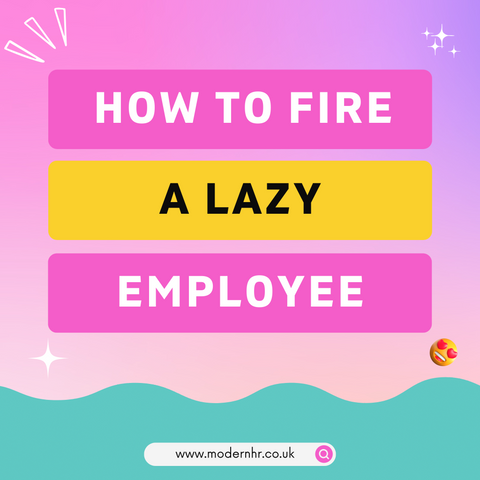How to fire a lazy employee

Why is it that some employees think it’s ok to never pull their weight?
They think it’s acceptable to be on Facebook most of the day; never offer to stay late and help meet a tight deadline; or perhaps even use the infuriating phrase ‘that’s not in my job description’.
It’s MEGA frustrating when you’re a small business owner and you’re paying for an employee who appears to be lazy. It’s also annoying for other staff, who are probably compensating for their colleague’s poor performance and wish their colleague would work harder.
If you manage this person (or work with one), it’s understandable if you think they should be fired for being too lazy.
But, before you jump to firing them, reflect on whether have you ever taken the time to find out why they are behaving in this way? For example, could they be suffering with depression, are they board in their role, are your biases causing you to think they are lazy, when they aren't.
Two Types of Lazy Employees
But, before we get into the formal performance management stuff, I strongly recommend you think about why this employee is being lazy.
In my experience as a HR Director, there are often two main types of ‘lazy’ employees.
Type #1: Disengaged Employees
The first are the ones who are very talented and capable of doing an amazing job but something has happened to make them disengaged.
It could be work related, for example they are bored, if there’s a lack of interesting work. Or upset that a co-worker has been given a pay increase and they haven’t, or perhaps they feel they’ve been overlooked for promotion, or they’ve fallen out with a colleague they used to get on well with.
Or perhaps it might not actually be anything to do with the job. The individual could be going through a difficult time outside of work - such as having relationship issues, family illness, debt, or dependency of some sort. Sometimes the effects of this spill over into work (after all, we're all human).
👉 With an open and honest conversations, these people can become fired-up and valuable again.
Type #2: Checked Out Employees
The second type of lazy employees are the ones who just have a bad work ethic. They want to do the bare minimum and probably don't really want to work for you. Sometimes it can be because they have too much baggage and are holding onto things that happened years ago (like someone else getting promoted over them) that they can't get over.
This type of person is more difficult to turnaround. You'll notice they don't respond well to feedback or want to engage in a constructive conversation with you.
👉 This tends to end up going down the formal disciplinary route.
When did the performance issues start?
The first thing to consider is why they are behaving like this and whether this is a new problem.
Has there been a workplace issue?
Consider if anything in your business could have triggered this change in behaviour or capability? Has your employee raised any complaints recently? Is there anything you can think of that they may be unhappy about?
Workplace triggers might include:
😠 An incident involving conflict (an argument, a challenging one-to-one session
🙍 A significant change in the type of work your employee does
⏰ A change in hours or pay
🤝 A new client or supplier
📈 A sudden increase or decrease in volume of work
🏥 An accident in the workplace
Workplace issues can lead to people going on secret strikes, in which they stop putting any effort into work and essentially show up, but do the bare minimum.
When did the laziness start?
If they’re an existing employee who’s usually quite good, could something have triggered the lack of effort and underperformance – either inside or outside of work? This is a situation that calls for a different kind of approach. One with a tender touch.
If they’re a new recruit, it’s harder to tell. But, you must have seen something special in them, to offer them employment in the first place so why do you think this is the case? 🤔
Could it be a sign of depression?
If this is totally out of character, it could be connected to their mental health. You have a duty of care to look after them, so if the laziness is actually depression in disguise, it's worth exploring this further. Have a look back at their employee health records, last Performance Appraisal or Employee Performance Review if helpful to see whether there's any useful info.
How to take control of this situation
I suggest you try to find out what’s going on and this is going to involve you having open and honest performance conversations with the individual. The intention is to make the employee aware of how they are coming across and give the employee feedback in the spirit of wanting to manage poor performance.
Have an honest conversation
Explain to the person what behaviour you’re seeing at work and describe the detrimental impact it’s having. Try to keep your language positive. Your aim is to encourage her to open up to you about what’s going on, rather than becoming defensive or confrontational.
If circumstances outside of work are causing this poor attitude, then your tendency might be to be lenient and overlook the behaviour to some degree because you want to be kind. Of course, listen and offer support where you can, particularly if this is a valued, long-term employee.
However, it could be that they have no reasonable explanation and perhaps they don’t really care about their behaviour. If this is the case you’ll need to be very clear on what your expectations are, what improvement you’re expecting and by when, and hold follow-up performance review meetings with them to check progress. Where possible, aim to have a robust approach to measure employee performance so you have evidence they are not meeting your requirements.
What happens if this approach doesn’t work?
What I’ve outlined is an informal approach as sometimes an honest conversation and a ‘heads up’ is all it takes for the lazy employee to pull their socks up and show the improvement you need to see.
If this doesn't make a difference or the employee is not engaging, it may be time for a more formal performance management approach, which is when you will need to consider disciplinary action.
I know it's not easy, but tackling poor performance at work sends a helpful message to the rest of the team that this sort of behaviour is not acceptable and won’t be tolerated. It also shows your team members that you care what the working atmosphere is like for everyone and that as a leader, you are confident and capable of taking action.







